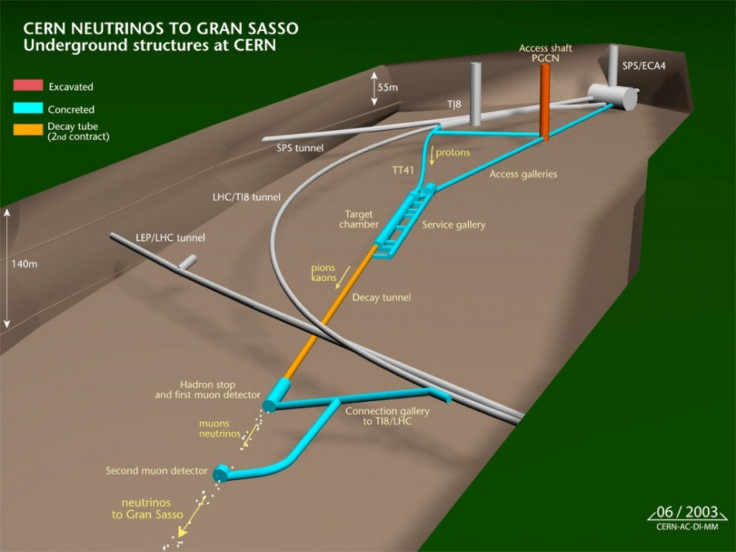Scientists Find Neutrino Particles Traveling Faster Than Light; Is Time Travel on Anvil?

Traveling to past has been part of only sci-fi world, but latest findings of a team of scientists could bring this into reality.
European scientists claim that neutrinos particles can travel faster than light, a startling discovery, if found true, would reverse Albert Einstein's 1905 theory of special relativity and even open up the possibility of time travel.
The results have been announced by scientists, dubbed as OPERA (Oscillation Project with Emulsion-Tracking Apparatus).
The OPERA neutrino experiment at the underground Gran Sasso Laboratory has measured the velocity of neutrinos from the CERN CNGS beam over a baseline of about 730 kilometer with much higher accuracy than previous studies conducted with accelerator neutrinos.
Under the experiment, scientists send tiny subatomic particles called neutrinos from CERN in Geneva to the INFN Gran Sasso Laboratory in Italy on a 730 kilometer journey and found that these particles traveled at 60 nanoseconds faster than the speed of light. Scientists calculated the margin of error at just 10 nanoseconds.
An early arrival time of CNGS muon neutrinos with respect to the one computed assuming the speed of light in vacuum of (60.7 ± 6.9 (stat.) ± 7.4 (sys.)) ns was measured. This anomaly corresponds to a relative difference of the muon neutrino velocity with respect to the speed of light (v-c)/c = (2.48 ± 0.28 (stat.) ± 0.30 (sys.)) ×10-5, according to the paper that would be presented at a meeting in European Organization for Nuclear Research (CERN) on Friday.
The latest findings may overturn Einstein's special relativity theory that states nothing is supposed to move faster than light, resulting in famous equation of E = mc2 which stands for energy equals mass times the speed of light squared.
Though the difference of speed compared to light is small, it could challenge the entire law of physics, open up the possibility of time travel and play havoc with longstanding notions of cause and effect. Most of the science-fiction stories are based on the concept that, if the light-speed barrier can be overcome, time travel might theoretically become possible.
The speed of the light is about 186,282 miles (299,792 kilometers) per second, which is the maximum speed at which all energy, matter, and information in the universe can travel. Under the special theory of relativity, a particle with subluminal velocity needs infinite energy to accelerate to the speed of light, although special relativity does not forbid the existence of particles that travel faster than light at all times.
It remains to be seen whether the discovery of OPERA is correct as these findings have yet to be independently verified.
My dream would be that another, independent experiment finds the same thing. Then I would be relieved, Antonio Ereditato, lead author of the study, told BBC.
© Copyright IBTimes 2024. All rights reserved.





















